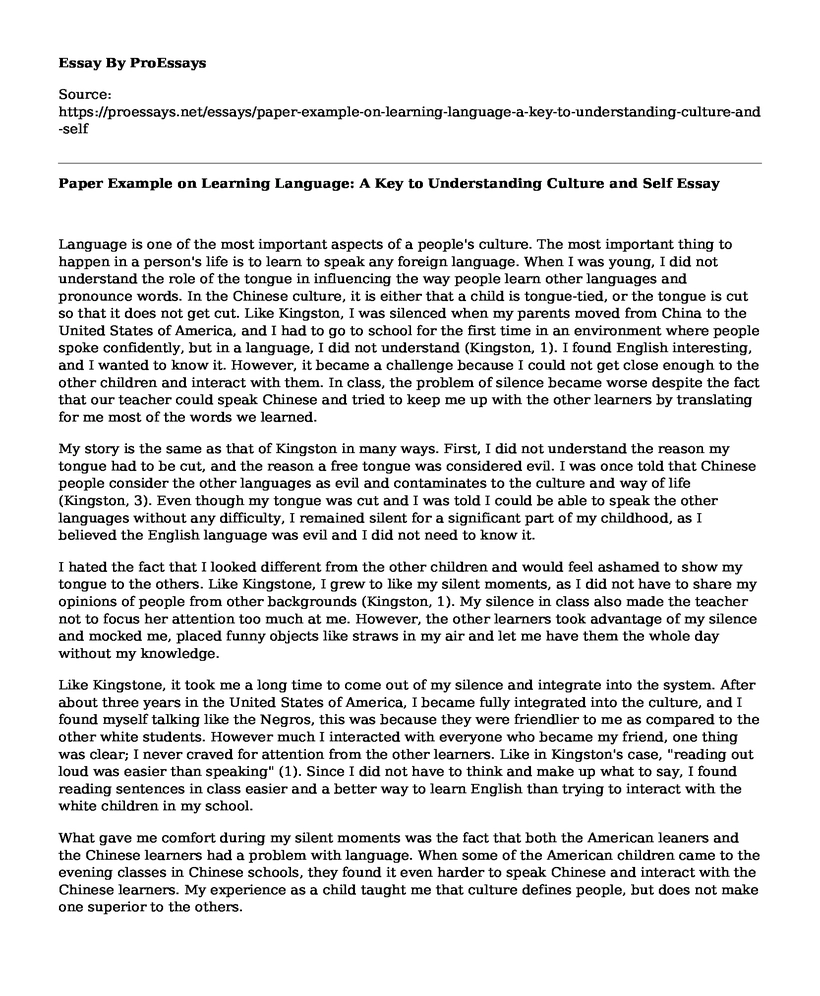Language is one of the most important aspects of a people's culture. The most important thing to happen in a person's life is to learn to speak any foreign language. When I was young, I did not understand the role of the tongue in influencing the way people learn other languages and pronounce words. In the Chinese culture, it is either that a child is tongue-tied, or the tongue is cut so that it does not get cut. Like Kingston, I was silenced when my parents moved from China to the United States of America, and I had to go to school for the first time in an environment where people spoke confidently, but in a language, I did not understand (Kingston, 1). I found English interesting, and I wanted to know it. However, it became a challenge because I could not get close enough to the other children and interact with them. In class, the problem of silence became worse despite the fact that our teacher could speak Chinese and tried to keep me up with the other learners by translating for me most of the words we learned.
My story is the same as that of Kingston in many ways. First, I did not understand the reason my tongue had to be cut, and the reason a free tongue was considered evil. I was once told that Chinese people consider the other languages as evil and contaminates to the culture and way of life (Kingston, 3). Even though my tongue was cut and I was told I could be able to speak the other languages without any difficulty, I remained silent for a significant part of my childhood, as I believed the English language was evil and I did not need to know it.
I hated the fact that I looked different from the other children and would feel ashamed to show my tongue to the others. Like Kingstone, I grew to like my silent moments, as I did not have to share my opinions of people from other backgrounds (Kingston, 1). My silence in class also made the teacher not to focus her attention too much at me. However, the other learners took advantage of my silence and mocked me, placed funny objects like straws in my air and let me have them the whole day without my knowledge.
Like Kingstone, it took me a long time to come out of my silence and integrate into the system. After about three years in the United States of America, I became fully integrated into the culture, and I found myself talking like the Negros, this was because they were friendlier to me as compared to the other white students. However much I interacted with everyone who became my friend, one thing was clear; I never craved for attention from the other learners. Like in Kingston's case, "reading out loud was easier than speaking" (1). Since I did not have to think and make up what to say, I found reading sentences in class easier and a better way to learn English than trying to interact with the white children in my school.
What gave me comfort during my silent moments was the fact that both the American leaners and the Chinese learners had a problem with language. When some of the American children came to the evening classes in Chinese schools, they found it even harder to speak Chinese and interact with the Chinese learners. My experience as a child taught me that culture defines people, but does not make one superior to the others.
Work Cited
Kingston, Maxine H. Tongue-Tied.
Cite this page
Paper Example on Learning Language: A Key to Understanding Culture and Self. (2023, Feb 12). Retrieved from https://proessays.net/essays/paper-example-on-learning-language-a-key-to-understanding-culture-and-self
If you are the original author of this essay and no longer wish to have it published on the ProEssays website, please click below to request its removal:
- Paper Example on African American History, Literature, and the Harlem Renaissance
- Gang Violence at Harper High School Essay Example
- Essay on Reviving Montessori Schooling: A Positive Transformation in North America
- Maximizing Student Self-Care: A Guide for School Healthcare Projects
- Five Stages of Literacy Development: Initial Stage - Essay Sample
- Paper Example on Japanese Imperium: Selfishness Over Diplomacy in East Asia
- Piaget's Theory in Practice - Report Example







